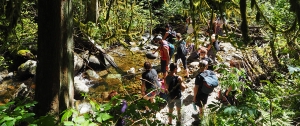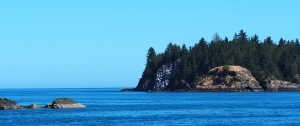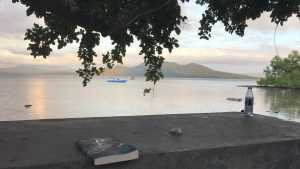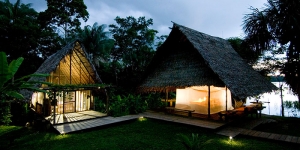Overview of Collaborative Field Schools
The Institute for Environmental Learning (IEL) is passionate about community engagement and teacher education and so the most important part of our work in has been in the development and delivery of innovative instructional programs that have been offered off-campus and in partnership with surrounding communities for many years. This collaborative teaching program has expanded to include interdisciplinary research collaborations with a variety of community partners. The following is a brief list of some of the collaborative teaching programs the Institute is linked with:
Vancouver Fieldschool (IEL and Oceanwise)

This fieldschool is offered each May/June in partnership with Oceanwise, and other Lower mainland community partners . In the current year the focus of the course is Ocean Literacy and will also feature new research ouputs from the Canadian Ocean Literacy Coalition (COLC). Students enrolled in this collaborative field school are included in a diversity of activities in the field. During this urban course, students visit water conservation reserves, wastewater treatment plants, landfills and urban gardens. Through a variety of critical experiences and reflection, students learn about the magnitude and complexity of environmental issues, about how urban communities function, and further, what role they individually play ‘in the mix’.
Haida Gwaii Fieldschool (IEL and Haida Nation)

This collaborative field school takes place within the context of Haida Gwaii each August and features opportunities for undergraduate and graduate students. The field school is also supported (in kind) by representatives from the Council of the Haida Nation, The Haida Gwaii Higher Education Society and the IEL. For 16 years the indigenous communities on Haida Gwaii have been a unique context for undergraduate and graduate students to work at tackling issues in rural, resource based communities: mapping out how rural and indigenous communities function and the implications of this for teaching. Students engage in wilderness experiences: developing leadership skills and cultural sensitivity that contributes to the unique learning environment that is the signature for this course.
Indonesia Fieldschool (IEL and UNSRAT)

This program occurs within the context of Manado, North Sulawesi in eastern Indonesia. It is sponsored jointly by the UNESCO co-chairs in Bio-Cultural Diveristy and Education as well as International Services for Students at SFU. Students participating in the current Indonesia field school will depart for Indonesia for 4 weeks during July 2020. The field school has been offered roughly once every 2 years since the fall of 2009. The program is offered in partnership with Universitas Sam Ratulangi (UNSRAT). Topics in the field school include history and geopolitics of the region, tropical botanical studies, ethno-botany and marine ecology. Students live and work together for 3-4 weeks interacting with local academics, teachers and schools in a variety of areas including the volcanic highlands, urban Manado and Bunaken Island’s coral reefs.
Amazon Fieldschool (IEL and KPU)

This field school will be offered this year by Kwantlen Polytechnical University during May 2020. As part of their studies, students engage in an intensive interdisciplinary field study in the Amazon Rainforest of Colombia as part of the Calanoa Project: an environmental and cultural learning centre near Leticia, Colombia. Here, they participate in cultural and creative immersion activities, assist with community development and conservation projects, and contextualize their field learning by classroom-based analysis and critical reflection before and after their field experiences. The field school offers students the opportunity to travel to the Amazon rainforest, participate in a multitude of interdisciplinary and cultural experiences, and bring to their studies a renewed depth, purpose, and global awareness. During the two week international field experience, also experience a range of local field trips exploring the unique biological and cultural diversity of the Amazon basin.
